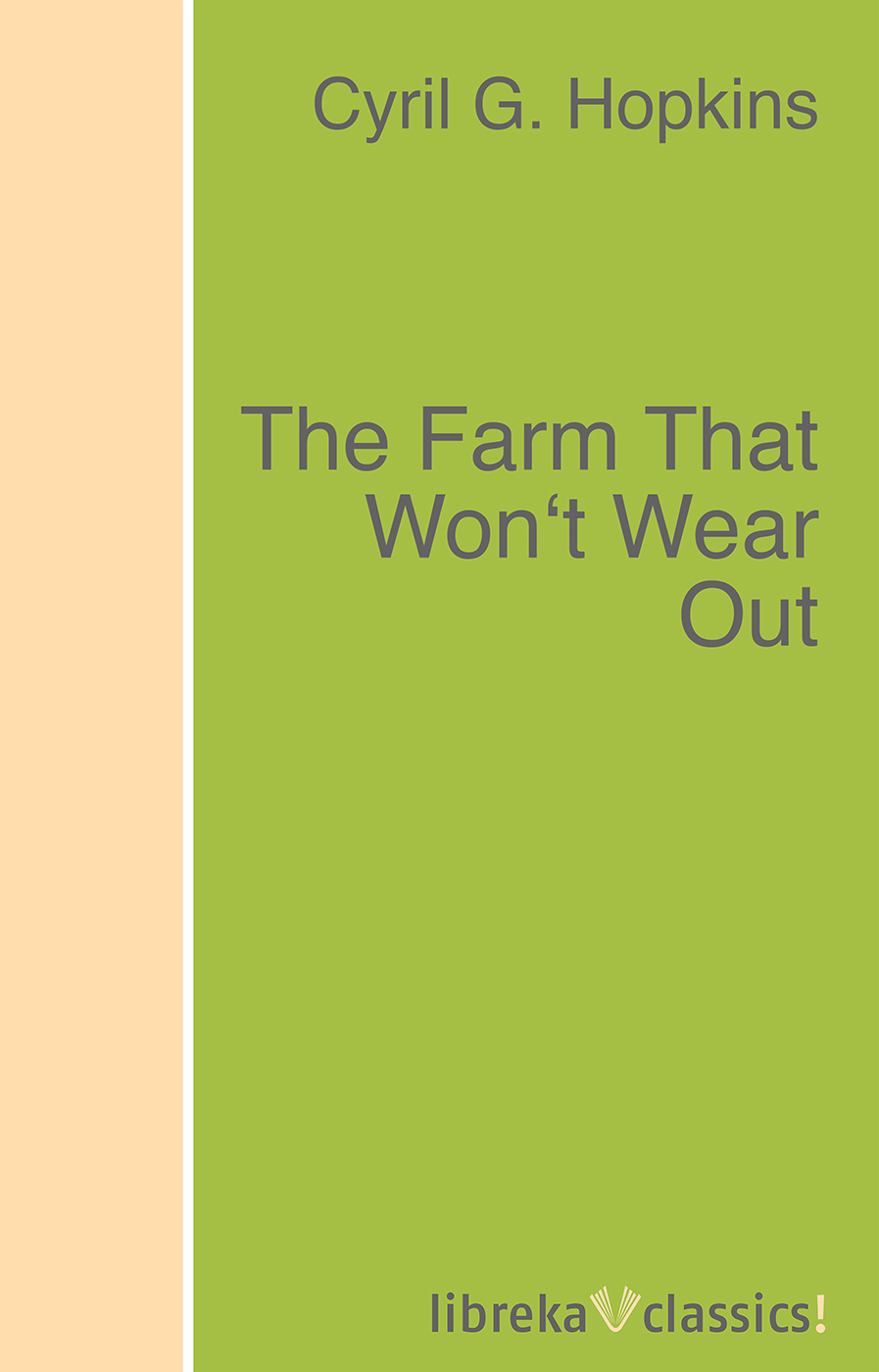
Полная версия
The Farm That Won't Wear Out


Titel: The Farm That Won't Wear Out
von Oliver Goldsmith, Samuel Pepys, William Dean Howells, John Burroughs, William Harmon Norton, L. Mühlbach, Franklin Knight Lane, Walter Pater, Jonathan Swift, Augusta J. Evans, Trumbull White, Kathleen Thompson Norris, Matthew Arnold, Charles W. Colby, Shakespeare, James Fenimore Cooper, D. H. Lawrence, James Joyce, Ada Cambridge, Philip E. Muskett, Catherine Helen Spence, Rolf Boldrewood, Ernest Scott, Fergus Hume, H. G. Wells, Victor [pseud.] Appleton, Roald Amundsen, Max Simon Nordau, Henry David Thoreau, E. Phillips Oppenheim, Richard Wagner, Franz Liszt, Charlotte Mary Yonge, Charles Henry Eden, Charles Babbage, T. R. Malthus, Unknown, Joseph Ernest Morris, Robert Southey, Isabella L. Bird, Charles James Fox, Thomas Hariot, Cyrus Thomas, Bart Haley, Christopher Morley, Edgar Saltus, Marie Corelli, Edmund Lester Pearson, Robert Browning, John Aubrey, Benjamin Nathaniel Bogue, John McElroy, John Galsworthy, Henry James, Hamilton Wright Mabie, Mina Benson Hubbard, Elizabeth Cleghorn Gaskell, John Keble, Henry Lindlahr, Richard Henry Dana, Annie Wood Besant, Immanuel Kant, John Habberton, Baron Edward John Moreton Drax Plunkett Dunsany, T. B. Ray, Isabel Ecclestone Mackay, Frank C. Haddock, William John Locke, baron Arthur Léon Imbert de Saint-Amand, Ralph Centennius, United States, Library of Congress. Copyright Office, James Otis, George Hartmann, Sir Arthur Conan Doyle, George Gissing, John Henry Tilden, Thomas Wright, Frederick Samuel Dellenbaugh, Anonymous, J. Clontz, David Hume, Margot Asquith, Elmer Ulysses Hoenshel, Byron J. Rees, Lida B. McMurry, Georges Duhamel, Ramsay Muir, Edith Wharton, Charles Sturt, Lola Ridge, J. M. Stone, Annie Payson Call, Grant Allen, kniaz Petr Alekseevich Kropotkin, Steve Solomon, Isabel Moser, Aleksandr Sergeevich Pushkin, Horace W. C. Newte, Charles Darwin, Maurice Maeterlinck, Walter Bagehot, Henri Bergson, George Randolph Chester, John S. C. Abbott, L. Frank Baum, William T. Sherman, Philip Henry Sheridan, Friedrich Wilhelm Nietzsche, Ambrose Bierce, Ulysses S. Grant, F. Scott Fitzgerald, Alfred Lichtenstein, Abbot of Nogent-sous-Coucy Guibert, Nellie L. McClung, Alice Caldwell Hegan Rice, E. Nesbit, Henri Barbusse, J. M. Synge, Frank Norris, Louis Hémon, Henry Van Dyke, Thomas Guthrie Marquis, Susanna Moodie, Frank Bigelow Tarbell, René Descartes, Kirk Munroe, Francis Hopkinson Smith, Edna St. Vincent Millay, Talbot Mundy, George Meredith, Clemens Brentano, James De Mille, James Allen, Norman Douglas, Bolton Hall, Arthur Christopher Benson, James Oliver Curwood, Frank Jardine, Bertram Lenox Simpson, Freiherr von Justus Liebig, Cyril G. Hopkins
ISBN 978-3-7429-4383-5
Alle Rechte vorbehalten.
Es ist ohne vorherige schriftliche Erlaubnis nicht gestattet, dieses Werk im Ganzen oder in Teilen zu vervielfältigen oder zu veröffentlichen.
The Farm That Won't Wear Out
By Cyril G. Hopkins
Preface
THE FARM THAT WON'T WEAR OUT
WAS FIRST published serially in THE COUNTRY GENTLEMAN, the privilege having been granted the author of subsequent publication. It is now issued in book form in response to numerous requests coming especially from the Central, Eastern, and Southern States.
CYRIL G. HOPKINS.
CHAMPAIGN, ILL.
"Population must increase rapidly, more rapidly than in former times, and ere long the most valuable of all arts will be the art of deriving a comfortable subsistence from the smallest area of soil."—Lincoln.
"It is not the land itself that constitutes the farmer's wealth, but it is in the constituents of the soil, which serve for the nutrition of plants, that this wealth truly consists."—Liebig.
CONTENTS
CHAPTER I: What Goes To Make Up Permanent Fertility CHAPTER II: The Nitrogen Problem And Its Economical Solution CHAPTER III: Phosphorus: The Master Key To Permanent Agriculture CHAPTER IV: Permanent Soil Fertility: Its Relation to Profits and Future Values
CHAPTER I
WHAT GOES TO MAKE UP PERMANENT FERTILITY
IT IS an old saying that "any fool can farm," and this was almost the truth when farming consisted chiefly in reducing the fertility of new, rich land secured at practically no cost from a generous Government. But to restore depleted soils to high productive power in economic systems is no fool's job, for it requires mental as well as muscular energy; and no apologies should be expected from those who necessarily make use of technical terms in the discussion of this technical subject, notwithstanding the common foolish advice that farmers should be given a sort of "parrot" instruction in almost baby language instead of established facts and principles in definite and permanent scientific terms. The farmer should be as familiar with the names of the ten essential elements of plant food as he is with the names of his ten nearest neighbors. Safe and permanent systems of soil improvement and preservation may come with intelligence—never with ignorance—on the part of the landowners.
When the knowledge becomes general that food for plants is just as necessary as food for animals, then American agriculture will mean more than merely working the land for all that's in it. This knowledge is as well established as the fact that the earth is round, although the people are relatively few who understand or make intelligent application of the existing information.
Agricultural plants consist of ten elements, known as the essential elements of plant food; and not a kernel of corn or a grain of wheat, not a leaf of clover or a spear of grass can be produced if the plant fails to secure any one of these ten elements. Some of these are supplied to plants in abundance by natural processes; others are not so provided and must be supplied by the farmer, or his land becomes impoverished and unproductive.

